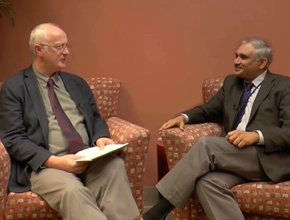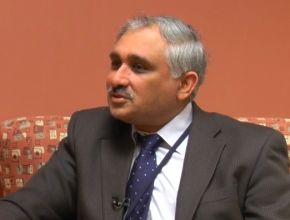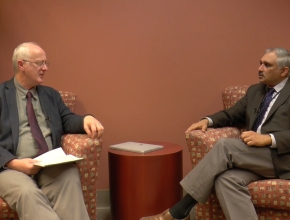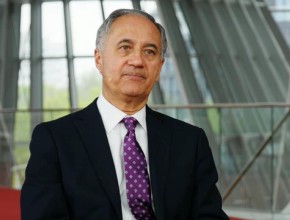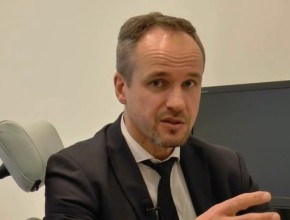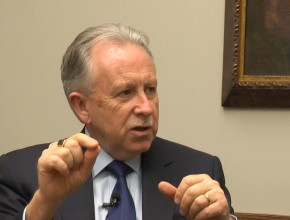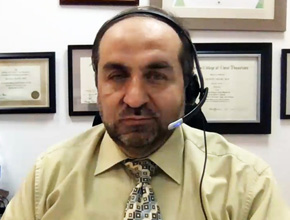References
Nair P, Wenzel S, Rabe KF, et al; ZONDA Trial Investigators. Oral Glucocorticoid-Sparing Effect of Benralizumab in Severe Asthma. N Engl J Med. 2017 Jun 22;376(25):2448-2458. doi: 10.1056/NEJMoa1703501. Epub 2017 May 22. PubMed PMID: 28530840.Roman Jaeschke: Good afternoon. Welcome to another edition of McMaster Perspective. I would like to introduce to you a leader in the introduction of biologic drugs in asthma, Professor Parameswaran Nair. Maybe I will start from a different question—because we will talk about biologics. You told me your views about the near future of medicine. Do you mind sharing your views with our listeners?
Parameswaran Nair: Thank you for having me on this program. It is strictly my own view. I scanned the cover of Nature publications over the past 2 years and it struck me that the way we practice medicine over the next 5 years is likely to change. I see 3 new developments that might change the practice of medicine.
The first is gene editing for single genetic disorders. I think this will really become mainstream for many hematological malignancies.
The second advance in my opinion is the increasing use of biologics and cellular-based therapies. We will be discussing some of those today. Biologics, as you know, have now become part of treatment for a wide variety of diseases, ranging from things that we never dreamt of: thyrotoxicosis, neurodegenerative disease, inflammatory bowel disease, arthritis, and many airway diseases we will be talking about today.
The third important advance in my opinion is going to be bioimaging. There are all sorts of modalities to get a glimpse into the body. In our own area we are increasingly using hyperpolarized noble gas imaging to assess ventilation and heterogeneity.
I think biologics in particular are going to make a huge impact in treatment. The cost is of course an issue, but I hope it will come down over time.
Roman Jaeschke: So the days of a few medications in our pockets are gone, by the sound of it.
Parameswaran Nair: No, they will not be gone. These designer drugs, designer medications will only be for the very severe patients. In the majority of patients, airway disease, asthma—that we will be talking about—could still be managed with currently available inhaled medications, inhaled corticosteroids and long-acting bronchodilators.
Roman Jaeschke: The gene modification that you are talking about—are we talking about very rare genetic diseases? Hematologic malignancies? Or are we also talking about more common cystic fibrosis? Or are we talking about Alzheimer and diabetes?
Parameswaran Nair: I do not know. I think we might be treating more common diseases as well in the future if they have got a single genetic problem. At the moment the evidence is only for the rare genetic disorders and hematological malignancies. But there is no reason why other diseases, like cystic fibrosis, with a single genetic disorder could not be treated with the technology of gene editing.
Roman Jaeschke: Ok. So let’s go to one of the areas that you mentioned: biologics. You know a lot about the use of those in asthma. Your last paper in the New England Journal of Medicine was about the use of benralizumab. Maybe you could summarize for us this study and its results?
Parameswaran Nair: That particular study was using a monoclonal antibody called benralizumab, which is an IgG1 antibody directed against the receptor for interleukin 5. Interleukin 5 is the main cytokine that is involved in the development, maturation, survival, and release of the eosinophil from the bone marrow. For severe asthmatic patients who have got a major eosinophilic component to their disease—in other words, if the eosinophil is a key effector cell in the pathobiology of their asthma—blocking the recruitment of the eosinophils in the bone marrow will be very effective. Benralizumab is one such drug. It is an afucosylated molecule, which means that the fucose moiety is removed from the hinge of the monoclonal antibody, and thereby it recruits the natural-killer cell to any cell that expresses a receptor to which this antibody is bound, and the natural-killer cell will cause death of that cell by the process of antibody-dependent cytotoxic killing; in a process very similar to how rituximab depletes B cells, benralizumab would deplete eosinophils. That is the basic biology and mechanism of how the drug works.
What we did in that study was to evaluate the efficacy of this molecule, which is administered subcutaneously at a dose of 30 mg either every 4 or 8 weeks in the most severe patients with asthma. These are patients who are on daily prednisone along with inhaled corticosteroids and long-acting bronchodilators. What we evaluated was whether the addition of this drug would help patients come off prednisone and at the same time maintain asthma control.
In this very large randomized trial by respiratory standards for prednisone-dependent asthma, over 200 patients were randomized to one of the two doses of benralizumab, 30 mg administered subcutaneously every 4 or 8 weeks, or placebo, over a 24-week treatment period. What we demonstrated was a significant, 70% average dose reduction of prednisone compared to placebo with a remarkable 70% relative risk reduction in asthma exacerbations. So despite the reduction of the dose of prednisone, we could reduce asthma exacerbation, demonstrating the very clear efficacy of this molecule.
Roman Jaeschke: So the effect was quite large. Are there any concerns about long-term side effects?
Parameswaran Nair: In this particular study, which was a short-term study, we did not experience any side effects. There were 2 patients who died in the study who had received the drug. None of the deaths were related to the intervention.
For a long-term treatment with benralizumab, because it depletes eosinophils, there is a theoretical risk that you may have a flare-up of a parasitic infestation if the drug is used in areas with problems with parasite infestations. A second theoretical risk is perhaps that there could be some intestinal cancers, because there is some animal evidence on association between eosinophils and cancer, although no causative link has been established. There is some evidence that eosinophils may be involved in tumor surveillance. But these are all theoretical. At the moment there are no risks that we know of.
 English
English
 Español
Español
 українська
українська

